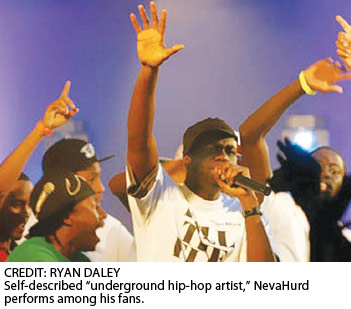Christian hip-hop artist praises God over dope

TORONTO (CUP) — There are few who choose to go against the grain when it comes to musical expression.
Popular hip-hop, in particular, is in a state that could be called clich� and gimmicky, lacking substance and obsessed with excess.
Ryan Daley's music is radical and rebellious, too, but not in the way you may think. Instead of rapping about the hip-hop staples — exorbitant wealth and blatant disrespect for women — Daley, a.k.a. NevaHurd, fuses into his infectious melodies and banging beats parts of his Christian faith, like forgiveness, love and peace.
As a self-described "underground Christian hip-hop artist," NevaHurd has been making waves in the Canadian Christian hip-hop scene for quite a while. Many have described him as one of the top Christian hip-hop artists in Canada, though he has not yet released an official album. His first, Unseen Proof, is scheduled to drop around June 2011.
Although he prides himself on being a Christian, he admits he is not perfect, and he uses his music to dismantle the happy-go-lucky Ned-Flanders Christian stereotype.
"Christians are real people — we go through some difficult things as well," said Daley. "I wanted to make music that appealed to non-Christians as well as Christians. I am not ashamed to talk about my faith, which is why I don't say my music is only for Christians."
He said he believes his music has a certain appeal.
"I offer something positive and uplifting to my community. I think it's pretentious and insincere to glorify a lifestyle that most people will never attain. I discuss issues like addiction, sexual promiscuity and abuse," he explained. "The overall message is that you can rise above your circumstances. I'm living proof that you can find peace. I'm not preachy; you either take it or leave it."
Daley's journey to his current place of peace, however, was not easy as he struggled to leave his lifestyle of casual sex and hard partying behind.
Daley discovered hip-hop at age 13, and the genre blew him away. At the time, hip-hop was refreshingly innovative, and had just begun to become mainstream.
"The first album I ever purchased was Enter the Wu-Tang (36 Chambers) by Wu-Tang Clan. It was raw and gritty," recalled Daley. "I was only 13, so some of the stuff these dudes were rapping about was a complete shock to me, but all my friends and I loved the music."
The album ignited within Daley a desire to emulate not only the music, but also the lifestyle it proffered. Donning the standard Timberland boots and baggy jeans, he immersed himself in freestyling, battling, writing and eventually became a hip-hop artist.
At 22, Daley formed a group with some childhood friends who shared dreams of becoming rap superstars. His big, brown eyes lit up as he reminisced about his first encounter with the stage.
"I took solace in the fact that people were actually listening to what I had to say. For the first time in my life, I felt as if I had a voice," said Daley. "I rapped about women, cars and money. Not original in the least, but people were listening."
When Daley turned 25, an epiphany struck.
"For about three years, I lived the same things that I talked about in my music, like smoking weed, going to the clubs to get drunk, sleeping with random women and disrespecting women because of my own immaturity," he said. "Then I realized I couldn't live like that anymore. It was physically and emotionally draining. I believe that God was speaking to my conscience at that time, and was telling me that I am more than that and have more to offer the world."
His decision to leave that world was scary at first, but Daley eventually found his calling in Christian hip-hop, and made a commitment to the youth of his community.
Nowadays, you will not find Daley in a club, but at various gospel concerts and youth outreach programs around Toronto, including Wisdom and Words, a music and spoken word event; The Spot, part of United Way Toronto, where youth gather to discuss world events and issues that affect them; and Toronto's Hunger, an annual fundraiser for the less fortunate.
"I just want to encourage kids who were just like me," Daley said. "It's very humbling when I see young black men and women who say my music has helped them through hard times. It's especially humbling because at one point in my life I was just like them, looking for someone to tell me there's hope and that my circumstances do not have to define who I am."













